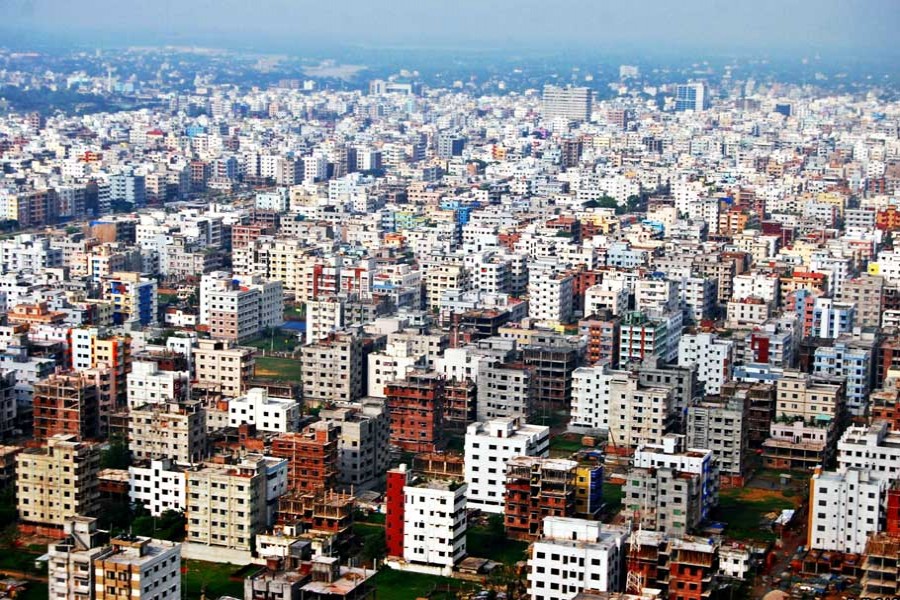As high as 57 per cent of Dhaka residents have expressed in no uncertain terms that they do not live here for the love of the city. They would have left for their villages had there been suitable employment and basic civic amenities there. All this is no wishful thinking but the finding of a study carried out by the Bangladesh Institute of Development Studies (BIDS). Clearly, the 57 per cent people who feel inclined to go back to where their mooring is rooted consider village life better than the life in this unliveable city. No wonder, in liveability index Dhaka has been ranking as the second or third worst among the world's cities for the past few years.
However, there is no reason to think the rest 47 have a strong bond with the capital city. Some are desperate to get out of here at any cost notwithstanding their spacious residences in posh areas. The exodus began in the 80's of the past century. Dhanmondi residential area bears the brunt of such an exodus. Many of the two-storey deserted houses there wore a pitiable look. Only recently have those plots found new owners who have built or are building multi-storey complexes -mostly commercial.
Migration of the educated and moneyed class to developed parts of the globe continues unabated. The BIDS study appears not to have focused on this privileged class. A new knowledgeable generation is emerging fast who hates spending hours on roads in atrocious traffic jams. They leave for higher studies and jobs abroad with no intention of returning back. If this upper class is taken into account, the percentage of intending or actual city leavers will be more than the BIDS finding. Then there is yet another class who want to enjoy the best of both worlds. They have second homes in Malaysia and Canada where members of their families live and they shuttle between Dhaka and their second homes.
Although, the study has not asked for everyone's opinion on the subject, it is fairly representative. Random selection of 3,100 households or approximately 12,000 people does the trick. Why people try to get out of the city is, however, no secret. At the top of the dislike chart, they put long tailback, heavy air pollution, lack of safe drinking water, poor road condition and water-logging. The respondents have mentioned eve teasing, safety concern, poor supply of gas and electricity. The problem of gas supply is mostly localised and power supply no longer causes people to suffer much. So, these two are unlikely to be compelling reasons for leaving the city.
As for eve teasing, not many can feel the depth of humiliation girls and women are subjected to. Only the victims know how demeaning it is for a human being. It is natural that such victims will look for an escape from the place where they encounter such undesirable situations. But like a virus it has also contaminated rural environment as well. Safety of life, though, hangs in the balance in an urban conundrum where people live without knowing the next-door neighbours. Criminals can use this unfamiliar factor for committing crimes. Deterioration of values and human relations, widespread misgivings together with lapses in establishing the rule of law do not help create a peaceful living atmosphere.
The list of downsides of city life may be longer still but then what is the allurement that draws people from all corners of the country to this megalopolis? First of all, it is the administrative hub with opportunities for employment. Even if it is not the country's main commercial centre, the service sector and non-formal employment sector make accommodation for the largest number of working hands. The country's best educational institutions are located here so are the best of hospitals, healthcare and other facilities.
Now the problem with the city is its excessive population. Ill-planned, the city is gasping for breath with chaotic expansion all around. Here is a city that records the slowest traffic movement in the region, heavy air and sound pollution. More and more people are falling victim to rash driving. All because discipline could not be enforced in case of vehicle's and people's movement. A city with an oversize population like that of Dhaka cannot be expected to run smoothly.
One of the solutions recommended by urban experts is to decentralise the administration. A centralised administration only compels people to look up to the capital for everything. In this connection, the government has of late started harping on a theme of turning villages into towns. If this is an exaggeration, the integral message is unmistakeable. If villages get some of the basic utility services, life there will be more desirable for many. Today most villages have power supply but it has to be ensured that it is uninterrupted.
Improved road communication, civic amenities and employment opportunities can make life in villages more attractive -- in the way it is in the countryside of Britain -- than in cities. With digitisation reaching its benefits at their doorsteps, villagers too will feel better off in their known environment.


